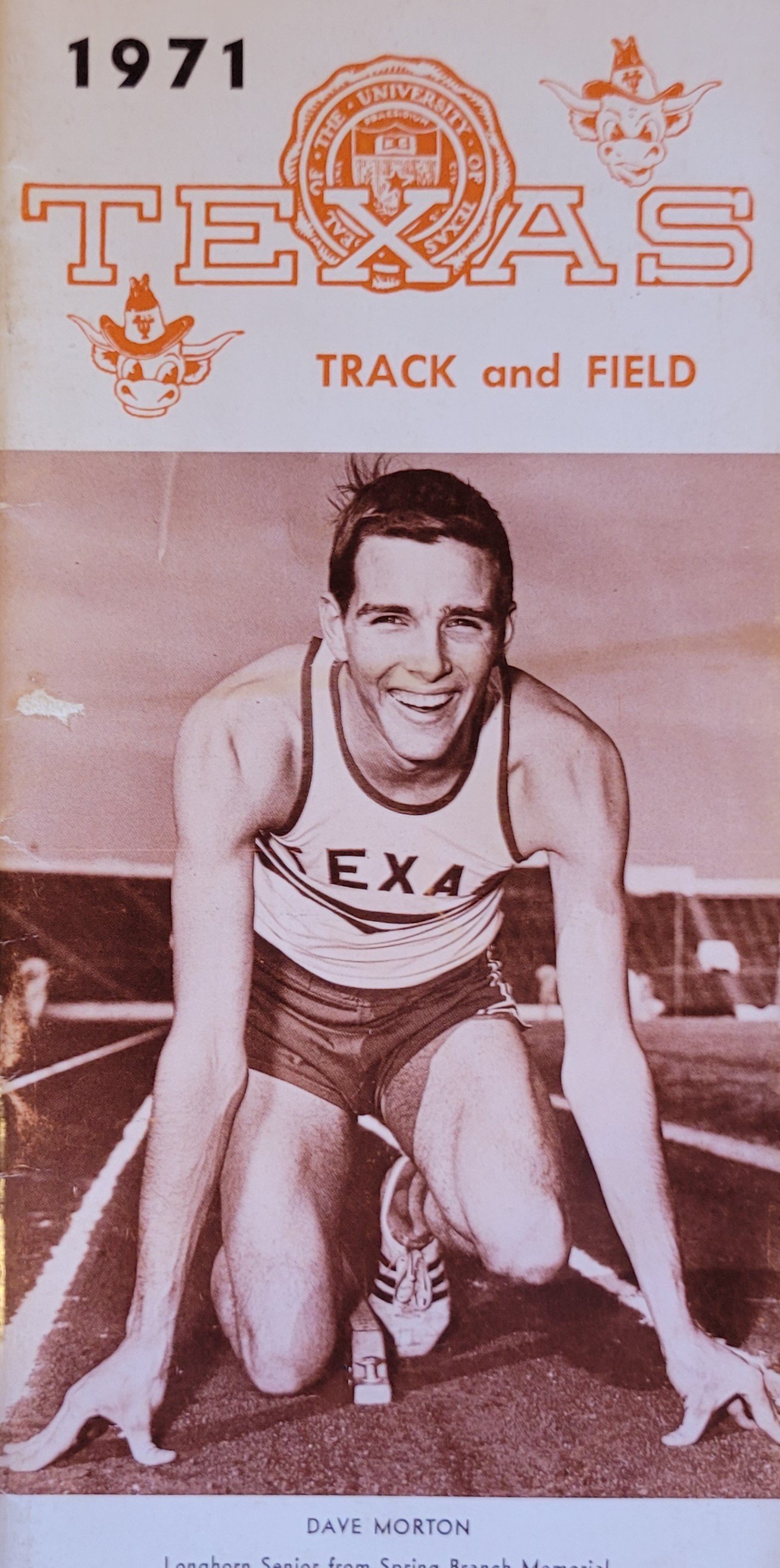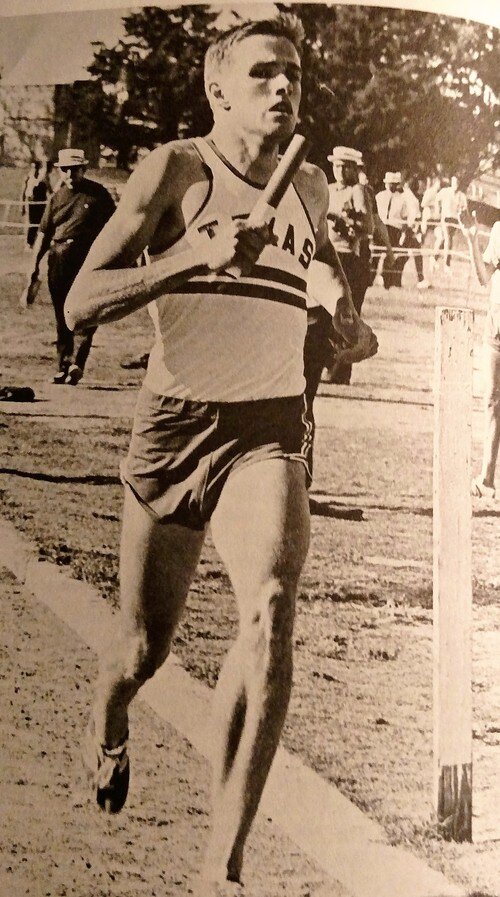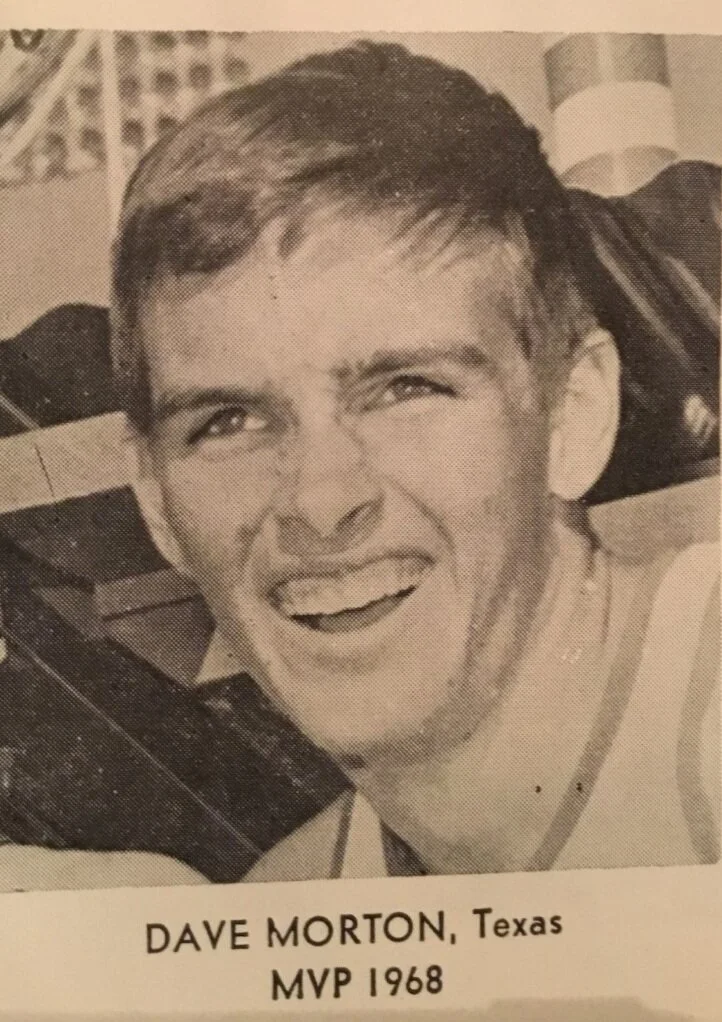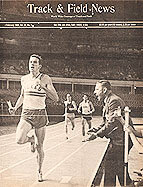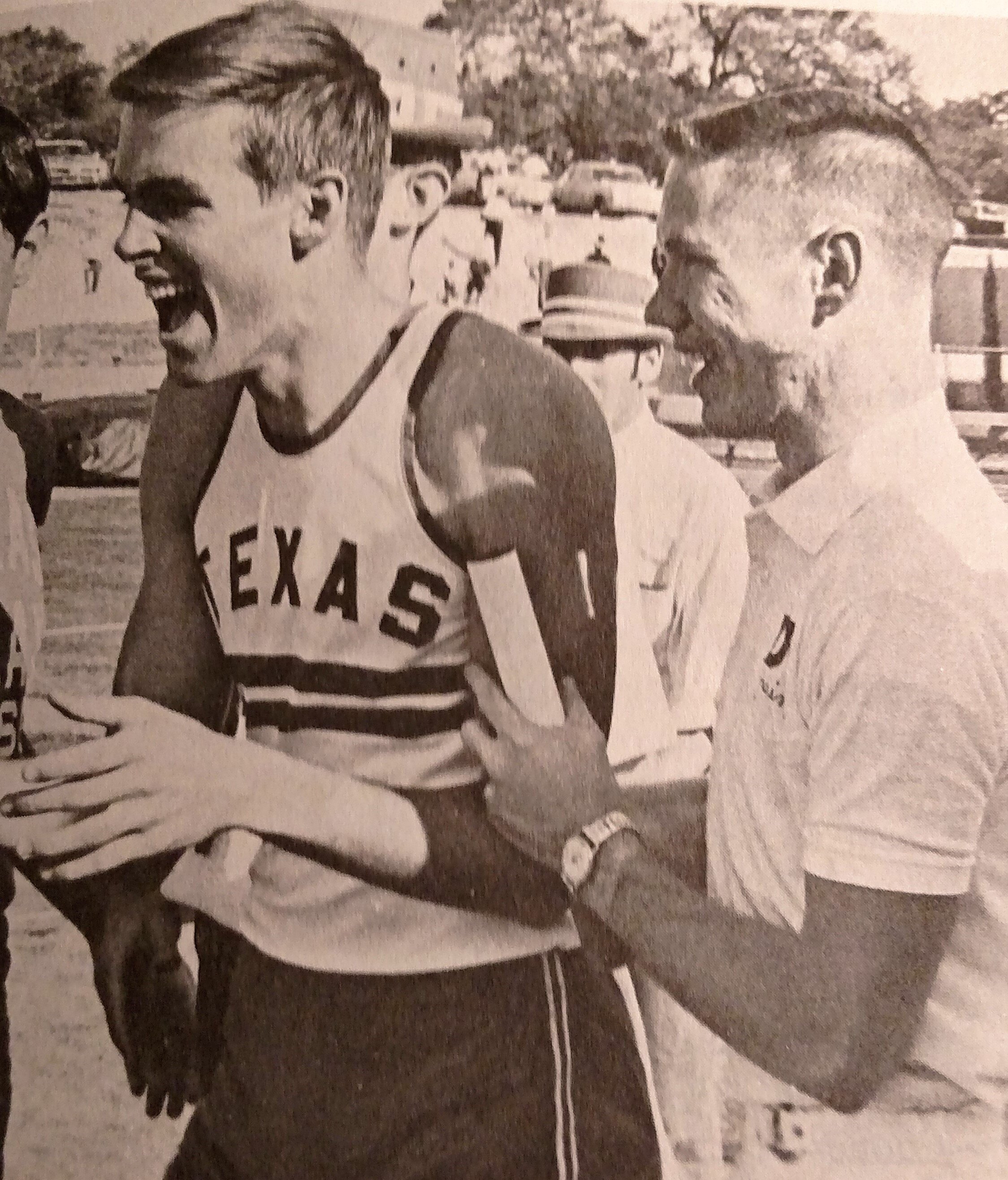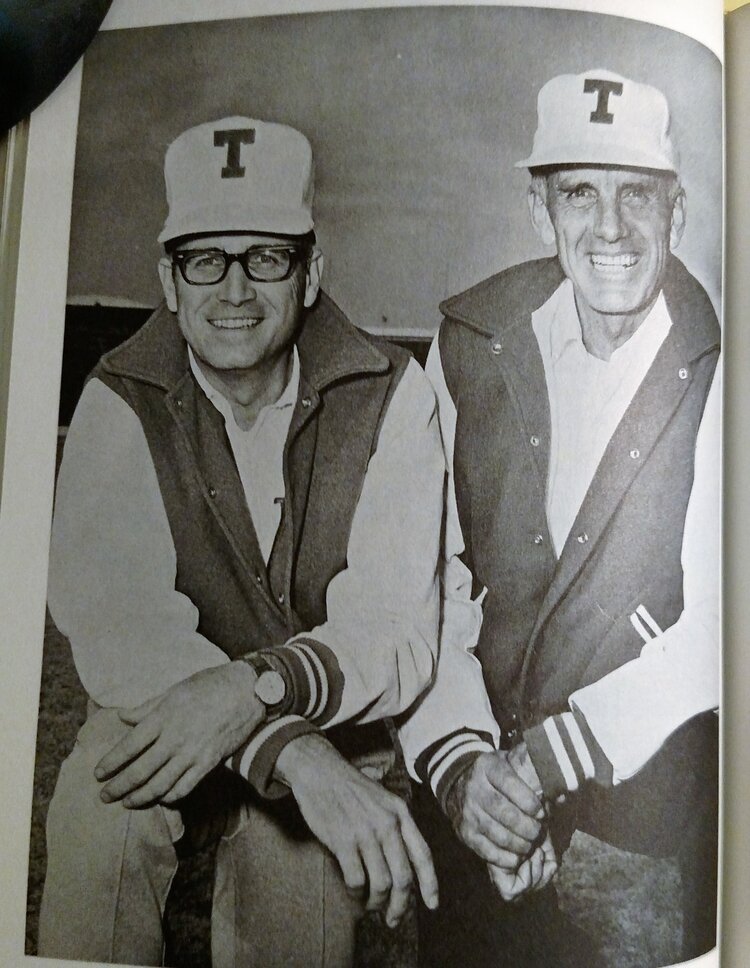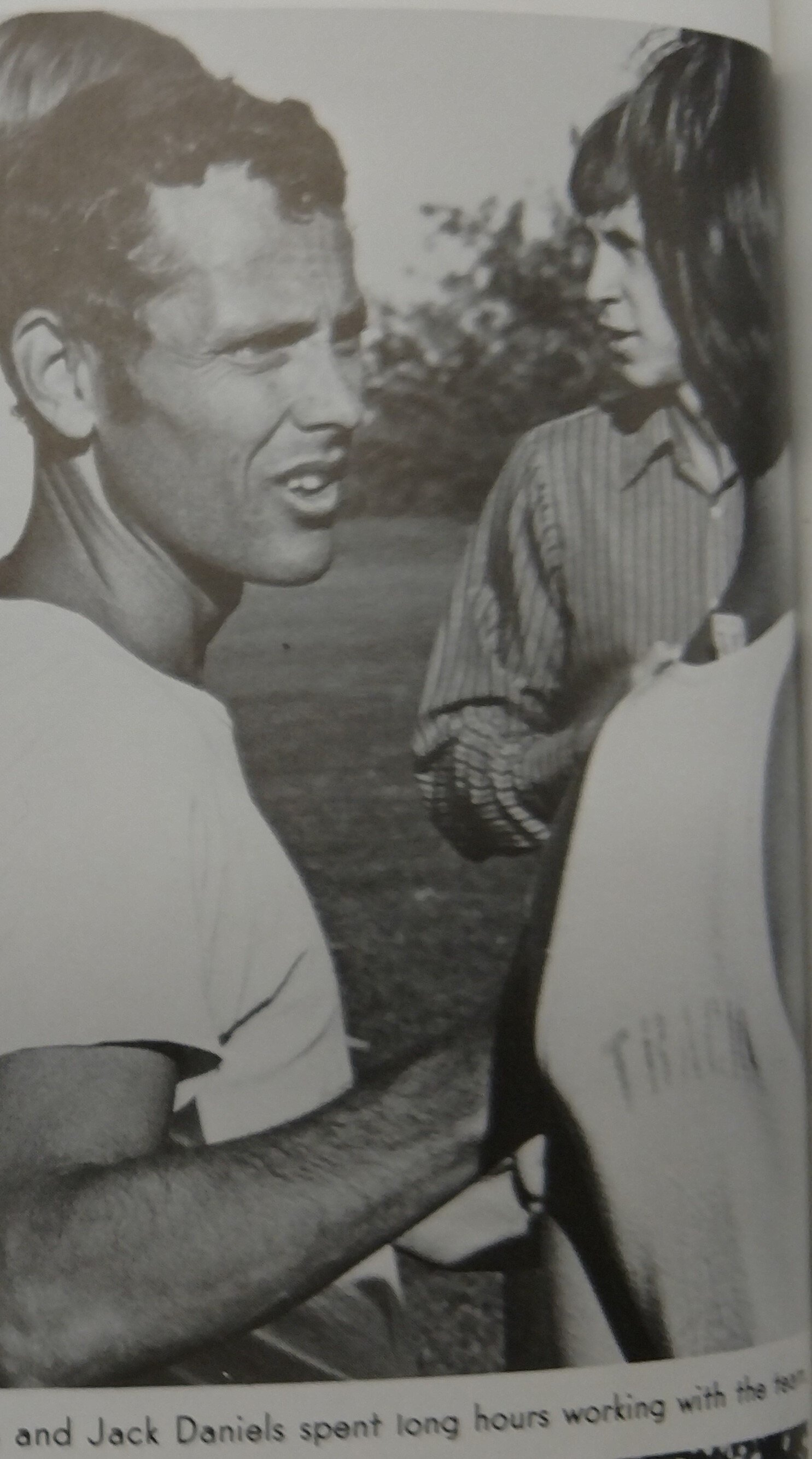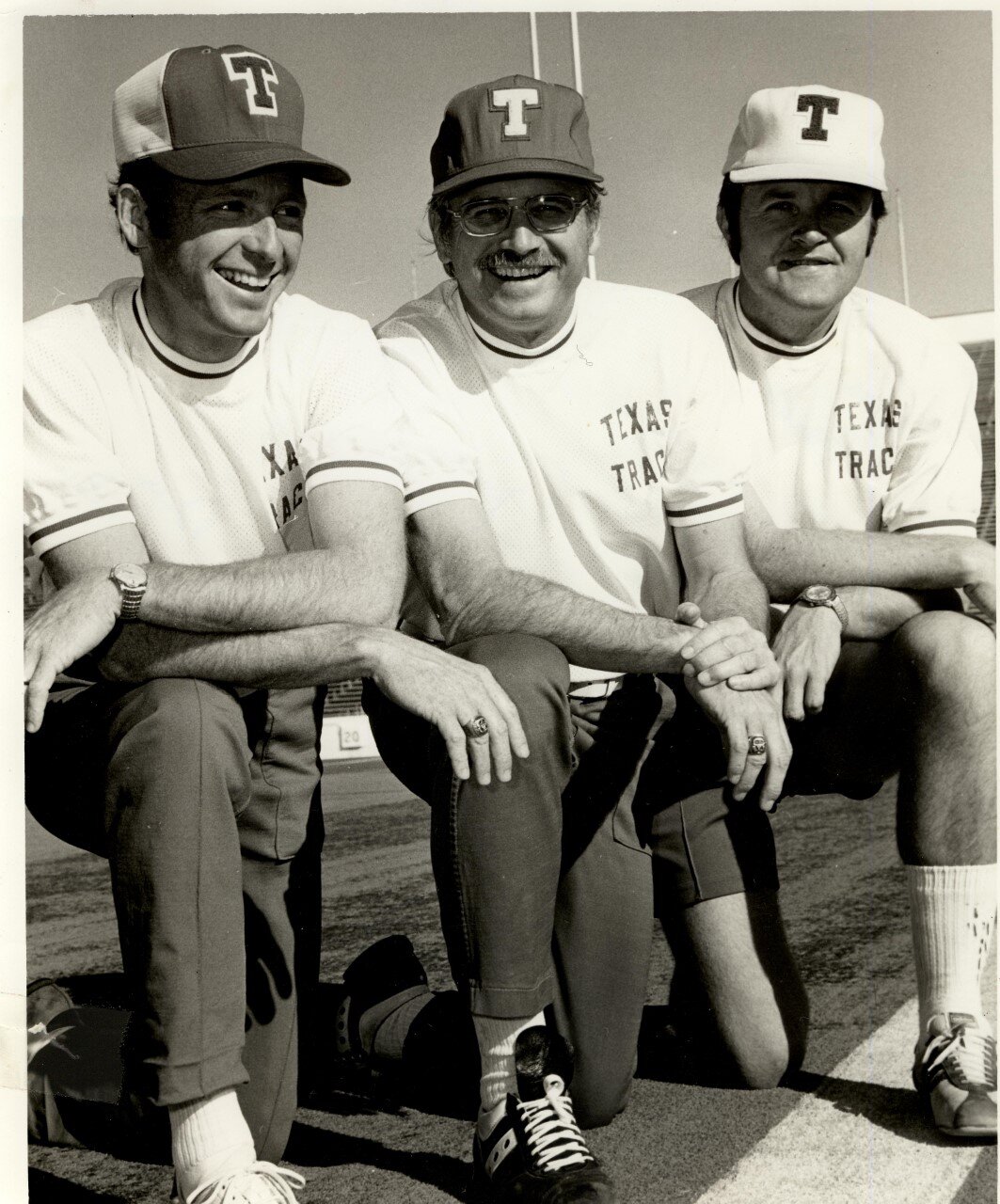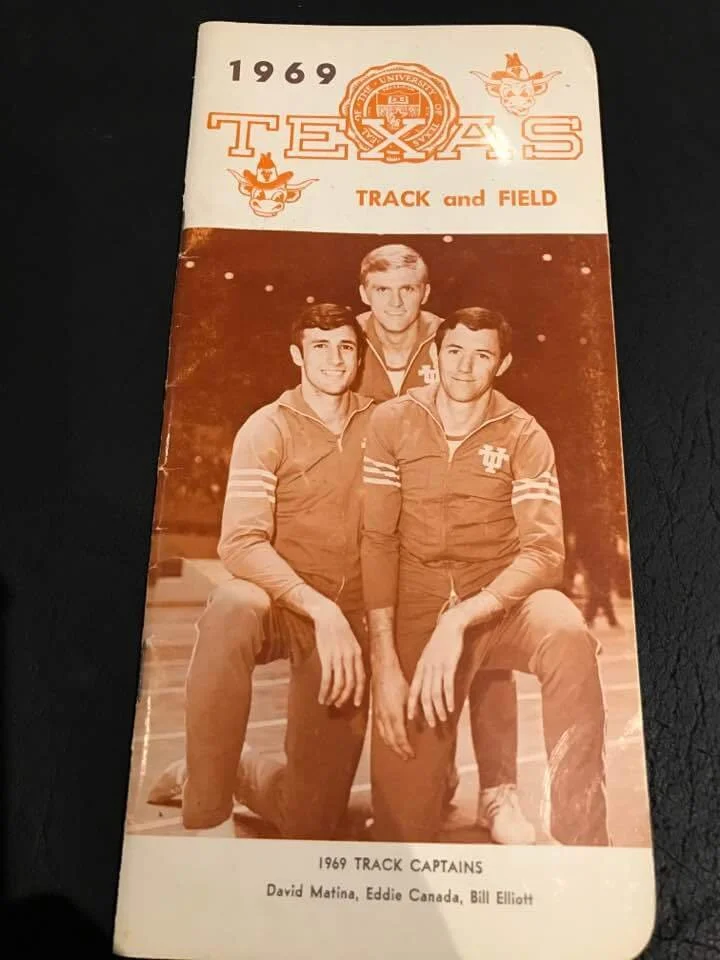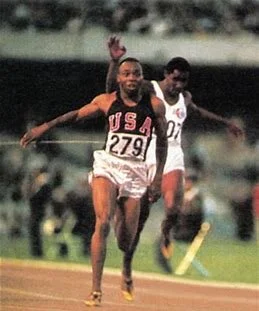Dave Morton’s T-RING REFLECTIONS May 2020
I was probably not all that easy to coach, although I tried to be. I guess by the time I got to UT I had too many good coaches (all with different styles), plus myself, and Dave Rickey, the manager and founder of the Houston Striders, who wasn’t so much my coach as he was someone who could talk me into attempting almost anything on the track, and a self-appointed publicist who was respected far and wide.
I came to UT with the expectation of team success and of my contribution to it. It was an honor to represent the team and the athletic department and subsequently the University. I always wanted to be considered in the same thought as the football team. I made good friends and played lots of Spades. I wound up using nothing that I studied in my professional career, but I treasure the time I spent there
For the record, Dave's initial autobiography written for the TLSN website did not mention any of his records. I ask him why, and he said his accomplishments would appear as bragging, and that might deflect from the parts of his life journey he wants to share with others.
Respecting his decision, please know that the track records and side notes denoted in a blue font were added by Billy Dale in order to capture crucial moments and comments in Longhorn sports history.
Dave’s Auto-Bio is in black font.
As of 2019 I am still introduced to the kids at my high school as "the legendary Dave Morton". Coach Taylor asked me last year what that was supposed to mean, and I told him that he was the only one in the room who had actually seen me run, so everything the kids had heard about me were just stories, some of which might even be partly true.
Dave Morton’s autobiography follows.
I guess it was almost inevitable that I came to the University of Texas. I was born in Houston to parents who had both graduated from the University, and my Grandfather, who lettered at Baylor in baseball, basketball, and cheerleading, had always wanted to go to Austin to play for Billy Disch.
We moved to New York when I was 3 ½, and spent the next 13 years bouncing between there and California. I would get back to Texas for a week or two every couple or three years in the summer, but by the time I started to high school, I pretty much considered Southern California my home.
However, one of my first music records, which we picked up in Austin on one of those summer trips, was “The Eyes of Texas” and “Texas Fight”. The indoctrination had begun early.
I was not a promising athlete before high school. I was always one of the last to get chosen in Little League and on the school ground. I basically hung around with the other nerdy guys and played in the band. Where we lived there were no other options. When I was in 7th Grade, my P.E. teacher told my parents to give me golf lessons, as I wasn’t going to be good at any sport and I might as well have something I could enjoy outside. I was out in LA with the Striders after I graduated from high school and I went back to see him and we had a good laugh about it.
Author Carlton Stowers and Wilbur Evans, in their book Champions, say that "Dave Morton at 17 was a precocious runner. He was one of the most highly recruited track stars of all time, finally choosing Texas over Stanford as his college of choice."
As a Longhorn, the authors of the book Champions can only use superlatives to describe Dave. Saying, "He was a competitor of national quality, a team man who contributed to numerous moments of Longhorn glory, and a youngster who had fun while doing it.".
When I started to Palos Verdes High School, Dad persuaded me to go out for the cross country team because I liked to run and my parents wanted me in something that would keep me busy and use up energy. The first day, the coach told us freshmen to run to Marineland and back. So like good bird dogs we took off. About halfway there, we realized it was a 12 mile round trip. We ran and walked and waved to the girls in the cars and got back about dark. We were completely hooked, and if we had stayed together, would probably have been a pretty decent 2 mile relay team. That fall was my first experience with really racing, and I actually won a race in front of my marching band practicing on the football field. After that, my mother did not have to pretend she was hiding and I didn’t have to pretend that I didn’t see her.
In the spring we had to try out for the track team. I made the team with a mediocre long jump and never did that again. My coach was Bill O’Rourke, and he was my first great coach. He decided I would be a good half-miler and had me start working out with the Varsity. The whole coaching staff taught the principles of how to be a good winner and how to be a good loser. And then, I had my first life-changing experience in track – Coach O’Rourke put together a freshman mile relay and put me on the anchor. We didn’t have an earth-shattering time, but we won and had a whole lot of fun. It would be two more years until I got to do it again.
Over the summer we moved to Ridgewood, New Jersey, where I had my 2nd good coach, a Biology teacher by the name of Arne Olsen. He would even run with us on Saturdays, teaching us what he knew as we ran along. We were pretty successful, and I began to realize that I was a better sprinter than distance runner. In the Spring, the track coach, such as he was, would stand out by the track in his overcoat and fedora, smoking a cigar and tell us to run laps. The track was not even a full 440 and it was not level. The cinders came out of the bottom of the school furnace, and some of the clinkers were bigger than walnuts. Additionally, the state athletic association rules said that if you ran a quarter mile or further, you could only run one race a day, so I couldn’t be on the mile relay. I wanted to run the half mile, but I was a sophomore, and there were two seniors who wanted to run the half. I got stuck in the quarter. It was a great experience, but as a 15 year-old with only one year of experience, I had to coach myself. The coach later said he assumed that I was still being coached by my old coach in California. We won our district, with only the guys from the Cross Country team scoring points.
During Dave’s Freshman year in high school he sets the national record in the 660 for 14 year olds at 1:22.8.
I was on a two-mile relay team that we took to the Penn Relays. There I got to meet Emmett Brunson and Augie Erfurth, the Rice coaches. At that point it seemed like the only way I would get back to Texas for college, and my grandparents lived a block off campus. Coach Brunson retired thinking that Texas had given me a car to come to Austin.
Thanksgiving of my Junior year in high school, we moved back to Houston and my world changed again. The rules of competition being what they were, I started at Memorial High School on Tuesday and ran my first Cross Country meet on Saturday in Beaumont. I had never seen a flat course before. We had been running a measured 2 ½ miles in New Jersey and had had frost since mid-October. In Texas, we were running a very nominal 2 miles and the temperature was in the low 70’s. I looked pretty good, but I was still a sprinter.
Coach Taylor at Memorial was my third good coach. I ran the half and was breathing down John Robertson’s neck at the state meet. We had 5 runners within 3 tenths of a second and I decided I never wanted to be a Finish Judge. Coach Taylor also moved me to anchor on the Mile Relay at the state meet, and I pretty much never went back.
Over the summer between my Junior and Senior years in high school, the guys on the team got together and decided we were going to win Coach Taylor a watch at the Border Olympics. (The coach of the winning Mile Relay team got a watch in those days). I also met Lonnie Schiller’s dad, Amos, I think through Boy Scouts. Our Cross Country team kept pressing forward, with Coach Taylor working with us in his spare time as Offensive Line Coach for the football team. I was consistently 4th or 5th man on the Cross Country team, but I kept telling myself that I was primarily trying to get in shape for Track season.
Dave’s Senior year in high school he sets the state record in the 880 at 1:49.9, which held for 34 years. He was also honored at the high school level as the best runner in America in both the 440 at 46.7 and the 880. At the Border Olympics as a high school athlete he ran a 1:50.2 880 and anchored the mile relay in 45.9 time. Still in high school at at an event in Los Angeles, Dave ran a 45.4 in front of 50,000 fans on ABC Wide World of Sports.
We had no competition in Houston or mostly in the state – just Corpus Christi Ray and Falfurrias, and Falfurrias was not in our division. I had to take the SAT the day of the State Meet, so we arranged for me to take it at Crockett HS in Austin. I came up the afternoon before and stayed in Lonnie Schiller’s dorm room. He handed me the key and disappeared. I got to Town Lake 30 minutes before the start of the meet, and Coach Patterson was the starter and finish judge, as Cross Country was not yet a UIL sport. Coach Taylor had told him what was happening with me, and Coach Pat was standing at the Finish Chute with a marker to write my number on my hand in case I didn’t get to the meet early enough to get that done.
After we got back to Houston, Coach Taylor started having time trials. Somebody started leaking our time to the papers. That got J. Fred Duckett involved. He was a voice of the Astros and the announcer for Rice football. He was considered to be the leading expert on high school Track & Field, and he was a friend of Coach Taylor. He was also one of my uncle’s closest friends. When I got such a big reputation by the end of that year, it was all because of J. Fred.
We won Coach Taylor his watch and maybe some more. He became the first coach to win the State Championship in both Track and Cross Country in the same year. It was exactly 50 years later that it was done for the second time. I had several scholarship offers and I even went out to visit Stanford, where I discovered that my connection to California was completely gone. I came home and committed to Texas right then. I think Coach Taylor was perhaps nudging me toward Texas all the time, and it turned out to be a good fit.
Coach Patterson said, "He's got a great deal of confidence-not cocky but confident; there's a difference. He loves a challenge and keeps his head no matter what the pressure might be." He was the captain of the team his senior year and led the Horns to the SWC championship. Dave had a great philosophy in life that captured his inner thoughts. He said, "no one becomes great in track or anything else if he doesn't enjoy what he's doing ………" In 1968 the Horns won the SWC championship with McDaniel, Matina, Canada, and Morton named to the All American Team.
One of the things I liked immediately about UT was that Coach Royal only promised me that I would have the chance to make the team. That may have been the fairest offer I got from anybody. I liked both Coach Patterson and Coach Price right away. I found the pairing to be the “ideal coach”. Where Coach Patterson was a little soft, Coach Price pushed a little too hard. I was at an indoor meet in Albuquerque when the Southwest Conference made freshmen eligible for Varsity competition. Coach Price had instructed me to take my uniform, and an hour or so before the meet Coach Patterson called and told me to wear it. It was a great feeling, even though I got 2nd in the 660 (behind the World Record holder).
I knew Coach Patterson had a beautiful daughter going to Baylor, and I knew where he lived in West Austin. In his fatherly fashion, he made sure I was out of town when she came home and that she was in Waco when I was in Austin. The last time I saw her was at Coach Patterson’s funeral.
During Dave’s freshman year at UT, the conference voted to allow freshmen to join the varsity. The coaching staff was ecstatic with the rule change because the "Morton Amendment" moved Dave to the varsity. As a freshman, ,he ran a 45.0 anchor on the mile relay at the Texas Relays and a 45.4 anchor at the Drake Relays, and set the SWC 440 record at 45.5 that stood for 12 years. Dave also went to the Olympic Trials in the 400 meters his freshman year , where he had a skirmish on national television with the Black Panthers organization.
My Sophomore year at UT things kind of got chaotic. I got sick after an indoor track trip to New York and Cleveland and Coach Price was pushing too hard in early workout. I didn’t really start feeling better until after the Southwest Conference Meet. Then I stepped on a sprinkler head while warming up in a park in LA and tore up my ankle. To my way of thinking, that season was a bust.
Over the summer, Coach Price went to Dallas Baptist to become Athletic Director and set up their initial program. We all wished him well. We had a poor recruiting year. The next summer, Coach Patterson moved to Baylor as Athletic Director. We all knew that was the position he really wanted, and we wished him well.
Coach Price came back from Dallas Baptist as Head Track Coach. There was some friction on the team as everyone he had not recruited had to get used to him. It was nothing major, and for me it was easy. But one awkward situation was that Dr. Jack Daniel had been working with the distance guys for a couple of years and Jim Ryun would come down occasionally to work with Jack. Many of the guys thought Coach Price would keep Jack as Assistant Coach, but Coach Price brought Bill Miller in.
I liked Jack as a friend, but he knew nothing about sprinters and multi-event men. David Matina and I would completely destroy his assumptions on a regular basis with our apparently unusual physiologies. Bill Miller and I had been at the AAU Nationals during the summer with the Striders, only I was the team captain and road manager, and was responsible for getting the hotel accommodations straightened out and getting him where he was supposed to be when he was supposed to be there. Bill was a superb long jumper, but he knew even less about running than I knew about long jumping, and it kind of rubbed a lot of people the wrong way. As team captain, I was drafted to be the spokesman for this group to Coach Royal, even though it was in no way my fight. I was trying to keep people from being kicked off the team while not antagonizing Coach Royal and not saying anything really stupid. I didn’t do a very good job, and there was always a gulf between Coach Price and me after that.
Dave’s Junior year he runs a 44.7 relay leg in the very first Astrodome indoor meet and a 44.8 at the USTFF meet in Wichita.
It was always easier for me to run on the relays than to run as an individual. I guess I was always secretly afraid that I really wasn’t as good as everybody thought I was. David Matina, and actually just about everybody else did not want to work out with me, as I always had to race and push myself to the limit in order to get faster. I enjoyed talking to the Press most of the time. I made friends all over the country; coaches, runners and spectators, and sometimes it seemed like my UT teammates were jealous of who I knew. I got to be teammates with some of the incredible athletes of the time.
Byrd Baggett shares a world record story
That night in Lawrence, four members of the UT track team unexpectedly made the finals of the sprint medley relay. Carl Johnson opened with a blistering 220 and handed the baton off to me (Byrd Baggett) to run the second 220. After running one of the fastest splits of my career, I handed off to Ed Wright, who ran a spectacular 440 leg. Ed made the final transition to Dave Morton as he anchored the relay with a world-class 880. The result: the fastest time in the world — 3:16.7.
We were a team, and, even though we didn’t always get along, we cared for each other and expected excellence. (Byrd Bagget also shares more Longhorn sports history on the TLSN website.)
Dave was a member of the Third Independence Day Games in Barbados, and he was chosen to carry the American flag into the opening ceremonies.
.
Morton’s most cherished memories
My Senior year at Texas at my last track meet, I was the last one out of the locker room, as I was the last one off the track. Coach and Mrs. Littlefield were coming down the steps and my parents and grandparents were waiting for me down there. I introduced the Littlefields to my grandparents, and then we found out that Coach Littlefield was my grandfather's first commanding officer in World War I.
They had not seen each other since 1918. We spent at least an hour with them catching up. That alone was worth 8 years of running for me.
David Matina - 880
In later years, I got to team up with David Matina again on the All-Army/All Air Force Track Team. I got to work with Fred Duckett for a number of years with him as announcer and me as starter of high school track meets, and I continued to work with Coach Taylor at the Will Taylor Relays in Houston, where he is the Meet Referee and I have been the starter for 43 years. I used to see Joe Cash and Mike Mosley before they retired and/or moved away, and I see Lonnie Schiller every year and I am getting better about seeing, or at least talking to David Matina, now that we have reconnected again.
And finally- I have fond memories of holding the blocks for Jim Hines the night he officially broke 10 flat for 100 meters, and he actually had 3 watches on him in the previous heat at 9.75, but the officials said nobody can run that fast, we must have missed the start. It was in Sacramento on a cinder track, in fact, the same one they used to run the Golden West high school meet on.

